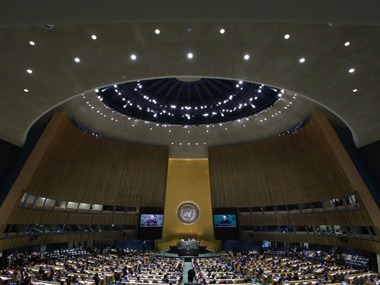
Pakistan’s Permanent Representative to the United Nations Munir Akram has said Prime Minister Imran Khan's debt relief proposal is one of the quickest ways to create fiscal space for developing countries so that they may recover from the crisis set off by the coronavirus pandemic.
"With adequate financial and technological support [from the developed world], the developing countries can build sustainable economic models without sacrificing growth," the Pakistani ambassador told the UN General Assembly’s Second Committee, which deals with economic and financial matters.
Participating in a debate on the global economic situation, he said Covid-19 has triggered the deepest recession since the Great Depression of the 1930s, disrupting trade, supply chains, businesses and jobs. “As usual the poorest countries have been hit the hardest by the pandemic,” he added.
He said the developing countries are struggling to find even a fraction of the financing they require.
Among the options for urgent action on an agreement for debt relief, he said, is extension of the Debt Service Suspension Initiative (DSSI) for at least another year, and coverage of the distressed Small Island Developing Countries (SIDS); net inflows from multilateral development banks (MDBs) equal to or more than a debt suspension; and cancellation or major restructuring of the least developed countries debt.
Most importantly, Akram said, the creation of at least $500 billion in new Special Drawing Rights (SDRs), and repurposing of unutilized SDR quotas, for allocation to the developing countries are necessary.
"I hope that the Organization for Economic Cooperation and Development (OECD) and G-20 partners will demonstrate the political will to adopt and execute these emerging measures," he said.
In the ECOSOC's Financing for Development (FfD) process, he said, the actions taken on these options are reviewed. In this regard, the Pakistani envoy also underlined the need for the critical policy actions to build the 'economy of the future".
“This will need restructuring the financial architecture to ensure greater equity and efficiency; a fair international tax regime especially to prevent tax evasion and creation of a fair and development-oriented trading system within the framework of the World Trade Organization.
“It will also need investment-led growth to ensure a resilient recovery and realization of the Sustainable Development Goals, and digitalization of developing countries' economies. The challenges the world faces today are daunting, but failure is not an option," Akram added.
He said while the International Monetary Fund (IMF) and the UN Conference on Trade and Development (UNCTAD) estimate that the developing countries need over $2.5 trillion to recover from the Covid crisis, the developed countries have negotiated a stimulus of $13 trillion to revive their economies.
Highlighting Pakistan’s efforts to fight Covid-19 and its impacts, he said despite financial constraints, Prime Minister Imran Khan injected over $8 billion – 3% of its Gross Domestic Product – to protect the poor and to keep the economy afloat amid the pandemic.
“Over 15 million families – covering the poor and the vulnerable 100 million of our 200 million people – were given cash assistance. Our financial plan was coupled with a strategy of 'smart lockdowns', which has fortunately controlled the spread of the virus," Akram said.
The ambassador hoped that a coronavirus vaccine would be available soon for everyone, everywhere, with equitable and affordable access to it. APP




1730797299-0/BeFunky-collage-(21)1730797299-0-165x106.webp)


1730799445-0/Untitled-design-(52)1730799445-0-270x192.webp)
1730800230-0/Copy-of-Untitled-(5)1730800230-0-270x192.webp)







1730706072-0/Copy-of-Untitled-(2)1730706072-0-270x192.webp)
COMMENTS
Comments are moderated and generally will be posted if they are on-topic and not abusive.
For more information, please see our Comments FAQ